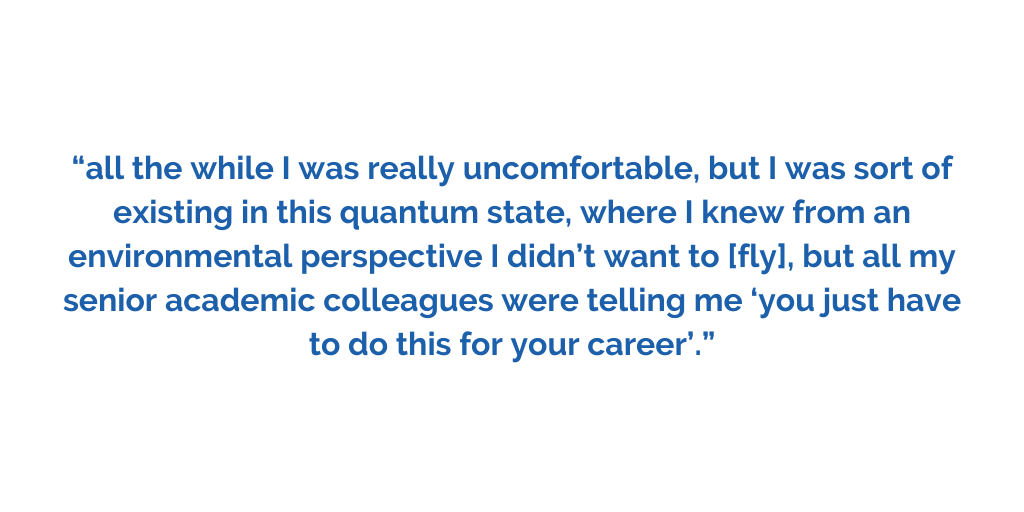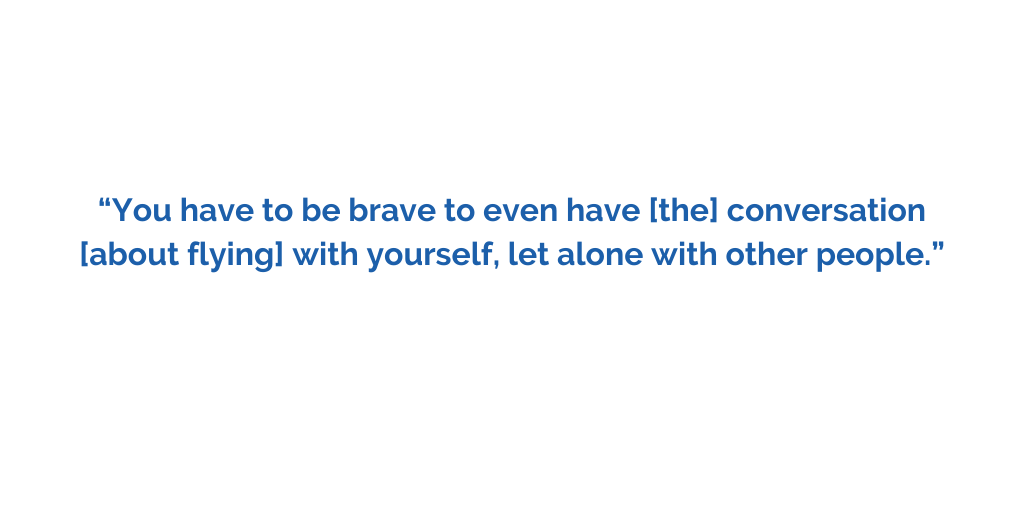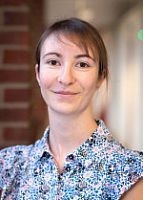Academics Who Travel Better: Dr. Charlotte Rae
A few weeks ago, a colleague at EAUC told me about Dr. Charlotte Rae, a lecturer at the University of Sussex who has not flown since 2014. As I have been working on resources to help colleges and universities confront their air travel, she thought I may be interested in knowing more about Dr. Rae’s experience.
The Travel Better Package encourages promoting instances where individuals have succeeded in reducing or eliminating air travel. I immediately contacted Dr. Charlotte Rae as I could not pass up the opportunity to share her journey with the FHE sector.
She kindly agreed to chat with me over Zoom and touched on some important points about air travel and academia.
How did Dr. Charlotte Rae begin to address air travel?
Dr. Rae is a lecturer in Psychology at the University of Sussex. As a teenager, she was interested in environmentalism and maintained this interest as she moved through school and then to university, studying the human brain. As she progressed in academia, she began to notice the endemic flying in the sector. Throughout her PhD, Dr. Rae found herself flying for conferences and job talks, telling me, “all the while I was really uncomfortable, but I was sort of existing in this quantum [or confused] state, where I knew from an environmental perspective I didn’t want to do it, but all my senior academic colleagues were telling me ‘you just have to do this for your career’.”

In 2014 during her postdoctoral position, Dr. Rae took her last flight; but this decision was not without some challenges. When asked by her principal investigator to represent him at a conference in New York, where funders would be present, Dr. Rae confronted her first big obstacle in realising her goal to remain flight-free: admitting her environmentalism to an institution. Dr. Rae tells me, “I felt I was letting down my boss, he needed me to step into the gap. I felt guilty I couldn’t help him out. I also felt it had taken a lot of courage to go against the dominant expectations.” When discussing this moment, Dr. Rae confronts an especially difficult topic: the fear and vulnerability we may feel to go against the grain, and the bravery it takes to reduce our flying while working in universities and colleges. She continues, telling me, “You have to be brave to even have [the] conversation [about flying] with yourself, let alone with other people.”
When Dr. Rae became a lecturer at the University of Sussex in the Spring of 2019, she recognised an opportunity to make her commitments public. When creating her new lab website, she decided to write a statement about her decision to avoid flying, particularly so that if she had to decline an invitation to speak at a conference only accessible through flying, a public online statement might better help her negotiate that situation.
Once again, Dr. Rae experienced some fear about publically committing to a flight-free path. She did not want to be perceived as a “difficult woman”- she simply wanted to lecture and conduct research in a field she was excited about without “causing trouble,” but, she also wanted to confront aviation’s impact on the planet. Before publishing the statement on her website, Dr. Rae nervously sent it her seniors, asking if it would be okay to publish.
Dr. Rae’s statement received support from her seniors who agreed that sustainability in academia was something that drastically needed addressing. She published the statement, alongside other environmental issues she was tackling, including the carbon footprint of scientific equipment, MRI scans and uploading data to public repositories. As of today, Dr. Rae says, “I’m not saying I’ll never fly again. But I honestly don’t think I could get on a plane right now, knowing what I know about the carbon impact from air travel.”
But how was Dr. Rae able to eliminate flying?
First and foremost, she chooses to attend conferences and meetings within the UK and Europe, which enables her to travel by train over plane. Since 2014, she has prioritised international conference attendance for the years the location is in Europe, and in between those years, focused her attendance on UK-based meetings, which means she networks with local colleagues more.
Alongside determination and lots of courage to stay true to her convictions and environmentalism, Dr. Rae discussed various material circumstances that helped her eliminate flying. For example, becoming a lecturer and signing a permanent contract afforded Dr. Rae the security to publically commit to not flying, something she felt was not as possible during her PhD and post-doctoral work.
Also, Dr. Rae, who is British, works in the United Kingdom and has family living in the country. She acknowledges the difficulties her colleagues and others may face if their professional and personal lives are more geographically fragmented.
Lastly, Dr. Rae’s discipline, neuroscience, involves looking at data from MRI scans- enabling her to conduct research locally, rather than through field trips abroad. Additionally, institutions in the United Kingdom are leaders in the field, meaning she is nearby to top researchers and does not feel a pressing need to travel internationally to collaborate.

Dr. Rae is a tremendous force in the movement to fly less through her decision to publically commit to not flying and through sharing knowledge about the impacts of air travel and how we can reduce and eliminate air travel in the sector. As we move forward, Dr. Rae hopes to see reduced air travel facilitated in grants (with increased travel budgets to support train travel within Europe over cheap flights), frequent flyer levies applied by each university when academics book travel, and better knowledge sharing about the impacts of air travel and ways to reduce it.
Dr. Rae would also like to see the sector present a strong position statement to the government and aviation industry about the impacts of air travel on climate change to spur proper structural change.
Thank you Dr. Charlotte Rae for sharing your journey to confronting air travel as an academic.
The Travel Better Package encourages promoting instances where individuals have succeeded in reducing or eliminating air travel. I immediately contacted Dr. Charlotte Rae as I could not pass up the opportunity to share her journey with the FHE sector.
She kindly agreed to chat with me over Zoom and touched on some important points about air travel and academia.
How did Dr. Charlotte Rae begin to address air travel?
Dr. Rae is a lecturer in Psychology at the University of Sussex. As a teenager, she was interested in environmentalism and maintained this interest as she moved through school and then to university, studying the human brain. As she progressed in academia, she began to notice the endemic flying in the sector. Throughout her PhD, Dr. Rae found herself flying for conferences and job talks, telling me, “all the while I was really uncomfortable, but I was sort of existing in this quantum [or confused] state, where I knew from an environmental perspective I didn’t want to do it, but all my senior academic colleagues were telling me ‘you just have to do this for your career’.”

In 2014 during her postdoctoral position, Dr. Rae took her last flight; but this decision was not without some challenges. When asked by her principal investigator to represent him at a conference in New York, where funders would be present, Dr. Rae confronted her first big obstacle in realising her goal to remain flight-free: admitting her environmentalism to an institution. Dr. Rae tells me, “I felt I was letting down my boss, he needed me to step into the gap. I felt guilty I couldn’t help him out. I also felt it had taken a lot of courage to go against the dominant expectations.” When discussing this moment, Dr. Rae confronts an especially difficult topic: the fear and vulnerability we may feel to go against the grain, and the bravery it takes to reduce our flying while working in universities and colleges. She continues, telling me, “You have to be brave to even have [the] conversation [about flying] with yourself, let alone with other people.”
When Dr. Rae became a lecturer at the University of Sussex in the Spring of 2019, she recognised an opportunity to make her commitments public. When creating her new lab website, she decided to write a statement about her decision to avoid flying, particularly so that if she had to decline an invitation to speak at a conference only accessible through flying, a public online statement might better help her negotiate that situation.
Once again, Dr. Rae experienced some fear about publically committing to a flight-free path. She did not want to be perceived as a “difficult woman”- she simply wanted to lecture and conduct research in a field she was excited about without “causing trouble,” but, she also wanted to confront aviation’s impact on the planet. Before publishing the statement on her website, Dr. Rae nervously sent it her seniors, asking if it would be okay to publish.
Dr. Rae’s statement received support from her seniors who agreed that sustainability in academia was something that drastically needed addressing. She published the statement, alongside other environmental issues she was tackling, including the carbon footprint of scientific equipment, MRI scans and uploading data to public repositories. As of today, Dr. Rae says, “I’m not saying I’ll never fly again. But I honestly don’t think I could get on a plane right now, knowing what I know about the carbon impact from air travel.”
But how was Dr. Rae able to eliminate flying?
First and foremost, she chooses to attend conferences and meetings within the UK and Europe, which enables her to travel by train over plane. Since 2014, she has prioritised international conference attendance for the years the location is in Europe, and in between those years, focused her attendance on UK-based meetings, which means she networks with local colleagues more.
Alongside determination and lots of courage to stay true to her convictions and environmentalism, Dr. Rae discussed various material circumstances that helped her eliminate flying. For example, becoming a lecturer and signing a permanent contract afforded Dr. Rae the security to publically commit to not flying, something she felt was not as possible during her PhD and post-doctoral work.
Also, Dr. Rae, who is British, works in the United Kingdom and has family living in the country. She acknowledges the difficulties her colleagues and others may face if their professional and personal lives are more geographically fragmented.
Lastly, Dr. Rae’s discipline, neuroscience, involves looking at data from MRI scans- enabling her to conduct research locally, rather than through field trips abroad. Additionally, institutions in the United Kingdom are leaders in the field, meaning she is nearby to top researchers and does not feel a pressing need to travel internationally to collaborate.

Dr. Rae is a tremendous force in the movement to fly less through her decision to publically commit to not flying and through sharing knowledge about the impacts of air travel and how we can reduce and eliminate air travel in the sector. As we move forward, Dr. Rae hopes to see reduced air travel facilitated in grants (with increased travel budgets to support train travel within Europe over cheap flights), frequent flyer levies applied by each university when academics book travel, and better knowledge sharing about the impacts of air travel and ways to reduce it.
Dr. Rae would also like to see the sector present a strong position statement to the government and aviation industry about the impacts of air travel on climate change to spur proper structural change.
Thank you Dr. Charlotte Rae for sharing your journey to confronting air travel as an academic.











